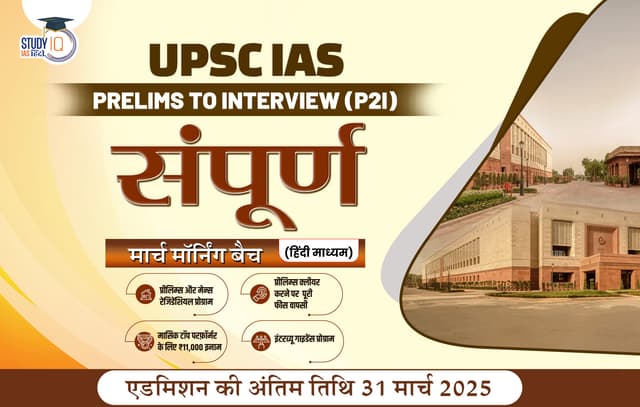indian polity
-
Electoral Reforms in India, Challenges, Reforms and Issues
Context: The Election Commission (EC) has invited political parties to discuss strengthening the election process. More in News This follows allegations of electoral roll manipulation during the recent assembly elections and concerns over duplicate Electoral Photo Identity Card (EPIC) numbers...
Last updated on March 20th, 2025 11:04 am -
Rule 267 of Rajya Sabha, Purpose, Process and Historical Context
Rule 267 of the Rajya Sabha Purpose: Rule 267 of Rajya Sabha allows a member to request the suspension of the day’s listed business to discuss a matter of urgent public importance. A member submits a notice under Rule 267...
Last updated on March 19th, 2025 06:08 pm -
Largest UT of India: Ladakh, Check All Details
Largest UT of India: India, the seventh-largest country in the world, consists of 28 states and 8 Union Territories (UTs). Among these UTs, Ladakh is the largest in terms of area. Spanning over 59,146 square kilometers, Ladakh was carved out...
Last updated on March 7th, 2025 05:57 pm -
List of Women Chief Ministers in India 2025
India has witnessed several strong and influential women leaders who have served as Chief Ministers across various states. These women have played a crucial role in shaping governance, promoting social welfare, and leading significant reforms. Their leadership has inspired future...
Last updated on March 7th, 2025 04:29 pm -
Concerns Over Duplicate EPIC Numbers in Electoral Rolls
Context: Recently, West Bengal's Chief Minister has raised concerns over duplicate Electors Photo Identity Card numbers in the electoral rolls. What Are EPICs (Electors Photo Identity Cards)? EPIC (Electors Photo Identity Card) is an identification document for voters. It was...
Last updated on March 6th, 2025 04:39 pm -
Dramatic Performances Act 1876, Provisions and Punishment
Context: Recently, Prime Minister Narendra Modi highlighted the importance of repealing obsolete colonial laws, mentioning the Dramatic Performances Act, which was officially abolished in 2018. Provisions of the Dramatic Performances Act, 1876 The Dramatic Performances Act law gave the British...
Last updated on March 5th, 2025 06:49 pm -
Advocates (Amendment) Bill 2025, Objectives and Key Provisions
Context: The Advocates (Amendment) Bill, 2025, was withdrawn recently after facing opposition from legal bodies. Objectives of Advocates (Amendment) Bill, 2025 The Law Ministry sought to amend the Advocates Act, 1961, to address “contemporary challenges” in the legal profession. It...
Last updated on March 4th, 2025 01:14 pm -
Animal Welfare Board of India (AWBI), Objectives and Key Functions
Context: Recently, the Animal Welfare Board of India has announced its Prani Mitra and Jeev Daya Awards. About Animal Welfare Board of India (AWBI) The Animal Welfare Board of India is a statutory advisory body on Animal Welfare Laws and...
Last updated on March 1st, 2025 07:44 pm -
Focus on Quality of Teaching, Not in 3-Language Formula
Context: Tamil Nadu has long refused to adopt the three-language formula, preferring a two-language policy. How Language Was Perceived Post-Independence Language as a Tool for National Integration After Independence, policymakers viewed language as a critical element for fostering national unity....
Last updated on March 1st, 2025 01:43 pm -
National Assessment and Accreditation Council (NAAC)
Context: Recently, the NAAC has undergone a series of reforms after the CBI launched an inquiry regarding bribery cases involving its assessors. About National Assessment and Accreditation Council (NAAC) NAAC is an autonomous body under the University Grants Commission (UGC)...
Last updated on February 28th, 2025 05:32 pm






















